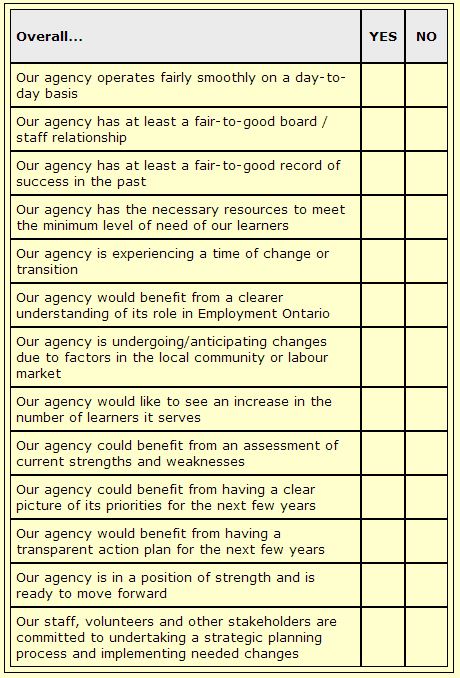 Strategic Planning
Strategic Planning
Module Overview
Community Literacy of Ontario (CLO) (www.nald.ca/clo) is delighted to present this online, self-directed training module on strategic planning. This module is designed to provide literacy agencies and others with insights, step-by-step procedures and the tools to take an organization through an effective strategic planning process.
This online training module was funded by the Ontario Trillium Foundation (www.trilliumfoundation.org). We are very grateful for their support!
What is Strategic Planning?
Strategic planning is a disciplined effort that results in fundamental decisions about what the organization will do. It employs concepts, procedures and tools that help managers with important decision-making for the future.
(John Bryson, a well-known author and an expert in strategic planning)
Strategic planning involves looking ahead, making decisions and taking appropriate action to avoid pitfalls and bring about improvements in an organization. It’s about planning for success. Although at first glance it may seem complicated, strategic planning can be straightforward. Community Literacy of Ontario is definitely taking a straightforward, uncomplicated approach in this training module.
Literacy practitioners frequently think and plan strategically. We are constantly striving to find more effective and efficient ways to operate our programs. For many, decision-making and ongoing adjustments are instinctive responses to challenges as they arise. Because such activities are an integral part of daily activity, most literacy practitioners are unaware of the actual number of changes they put into effect on a regular basis and never think to count them as strategic improvements.
“I don’t really think about it. I just know what’s the right thing to do, and I do it”.
(Quote from an Ontario literacy practitioner)
It is useful to know that there are such highly skilled literacy practitioners among us who can operate in this informal way to great advantage. However, a downside of informal planning is that because the process is not documented and recorded anywhere, much of the high quality work of the agency goes unappreciated and unaccounted for.
As we implement a new quality management system called Continuous Improvement Performance Management System (CIPMS), literacy practitioners are learning that skills in planning and documenting program development and growth are necessary. Also, as agencies grow into new roles within Employment Ontario, the time is ripe for learning how to conduct effective strategic planning.
The concept of planning for success is actually a simple one. It’s about looking at where you are now, where you want to be in the future and how you will move from here to there. Strategic planning, however, formalizes the process, focuses the scrutiny involved and is more structured in following particular steps and documenting findings.
The literacy world is not alone in recognizing the importance of strategic planning. Most successful not-for-profit organizations, businesses and corporations engage in a formal strategic planning process every three to five years. In times of rapid growth and change, strategic planning may occur more frequently.
In Support of Strategic Planning
Here are just a few of the underlying reasons for strategic planning.
- Changing times. Times are changing, and as a result there are changing demands in our work. Expectations for what must be achieved are different now so the outcomes and targets we planned to achieve ten years ago may no longer be relevant.
- Efficiency. Time is money as the saying goes, and today greater emphasis is placed on efficiency in both the private and public sectors. Mastering time management, streamlining our pursuits, and focusing our energies has become very important in demonstrating capacity and effective management. We are expected to do more with less – which is true for the private and voluntary sector, not just for literacy. It means that not only must we continue to lobby for more funding, but that we have to get better and more creative in using the resources that we already have.
- Focus. Strategic planning can help literacy agencies focus their efforts on key organizational mandates and goals. A strong focus can lead to increased organizational effectiveness and efficiency.
- Partnerships. Our working environment has changed. Where once we worked as independent agencies, now partnerships of many kinds are encouraged or required. For example, literacy agencies are now part of Employment Ontario (see:www.edu.gov.on.ca/eng/tcu/employmentontario/). In addition, literacy practitioners often work more closely with their colleagues in other sectors and streams as well as with other social service providers in their communities.
When Strategic Planning is Not Appropriate
Although there are many good reasons for engaging in strategic planning, under certain conditions strategic planning may not be helpful.
- Strategic planning will not be effective when an agency is in crisis. You cannot realistically look into the future and plan for the long-term when next month is in jeopardy. When an agency is in crisis immediate intervention is required, radical surgery and maybe some space and time to heal.Examples of severe agency crisis might include:
- Sudden departure of key staff, board members or volunteers
- Unexpected withdrawal of significant support i.e. loss of location, funding or partnerships
- Strategic planning is not the solution for conflict. Some people think if they ignore a problem and concentrate on something else, the problem will go away, but experience has taught us that doesn’t usually work.Examples of severe conflict might include:
- Serious personality conflicts within the agency that affect the smooth running of day-to-day operations
- Conflicting priorities, misunderstandings and unresolved issues between the staff and members of the board
- Public contention between an agency and another organization or group in the local community
Expected Results
Literacy agencies that engage in a strategic planning process can expect some very positive results.
Are you ready?
Here is a checklist of indicators that can assist you in deciding if now is a good time for your agency to engage in a strategic planning process.
Check yes/no as appropriate for the following statements.
If you were able to indicate “yes” to a good number of these indicators, then your agency is likely in a good position to engage in a strategic planning process. If you said “no” to many of these items, consider what smaller steps you might take to start your agency on the road to strategic planning.
More Online Resources
Carter McNamara is a well-known guru of strategic planning. Check out this valuable online resource called “Strategic Planning in Non Profit Organizations”: www.managementhelp.org/plan_dec/str_plan/str_plan.htm.
This article called “The Pitfalls and Positives of Strategic Planning” further explores some of the benefits of strategic planning as well as describing some of the potential problem areas: https://charityvillage.com/topics/management/planning/strategic-planning.aspx.
If you anticipate some challenges (which is always wise!) as well as benefits, be sure to read this excellent article called “Overcoming the Barriers to Strategic Planning” at: https://charityvillage.com/topics/management/planning/strategic-planning.aspx.
Questions and Activities for Reflection
- What benefits would strategic planning bring to your agency?
- What pitfalls and challenges might you face and how do you address these before getting started?
- Is your agency ready for strategic planning? Why or why not?
- If your agency is not yet ready, how can you help prepare your agency for strategic planning?








